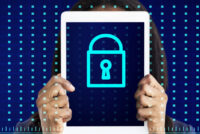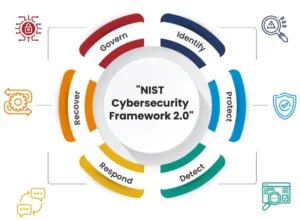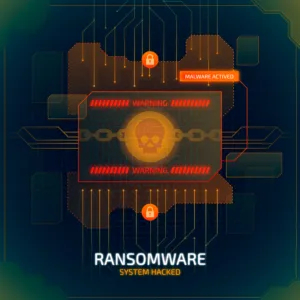
Table of Contents
I. Introduction
In today’s digital world, the importance of cybersecurity has grown exponentially due to several key factors:
1. Proliferation of Digital Assets: Businesses and individuals alike store and transact an ever-increasing amount of sensitive information online. This covers personal data, financial records, intellectual property, and more. Protecting these digital assets has become crucial.
2. Cyber Threat Landscape: Cyber threats are constantly evolving, becoming more sophisticated and widespread. Threat actors include hackers, criminal organizations, nation-states, and even insiders. Cybersecurity is necessary to defend against these threats.
3. Economic Implications: Cyberattacks can result in significant financial losses for organizations. From direct financial theft to the costs associated with breach recovery, the economic implications of cybersecurity incidents are substantial.
4. Privacy Concerns: There is a growing awareness of privacy issues among individuals. Data breaches and privacy violations erode trust, and organizations are under increasing pressure to protect user data.
5. Regulatory Compliance: Governments around the world are enacting stricter regulations (e.g., GDPR, CCPA) that require organizations to implement robust cybersecurity measures to safeguard customer data. Non-compliance can lead to severe penalties.
6. Remote Work and Cloud Adoption: The COVID-19 pandemic accelerated the adoption of remote work and cloud computing. While these technologies offer flexibility and efficiency, they also introduce new security challenges that need to be addressed.
II. Significance of Cybersecurity certifications in today’s job market:
1. Skill Validation: Cybersecurity certifications validate an individual’s skills and knowledge in various areas of cybersecurity, including network security, ethical hacking, incident response, and more. Employers can trust that certified professionals have a solid understanding of best practices.
2. Career Advancement: Holding cybersecurity certifications can open doors to better job opportunities and higher-paying roles. Many organizations require or prefer certified professionals for cybersecurity positions.
3. Industry Recognition: Certifications from well-known organizations like CompTIA, CISSP (Certified Information Systems Security Professional), CISM (Certified Information Security Manager), and others are highly regarded in the industry. They provide recognition and credibility.
4. Staying Current: The field of cybersecurity is dynamic, with new threats and technologies emerging regularly. To stay relevant, professionals must continually update their knowledge and skills, which certifications often require through ongoing education and recertification.
5. Security Leadership: Advanced certifications like CISSP and CISM are considered prerequisites for leadership roles in cybersecurity. They demonstrate expertise in strategic planning and management, which is crucial in protecting an organization’s digital assets.
III. Why Get Certified in Cybersecurity
Getting certified in cybersecurity offers numerous benefits, ranging from enhanced career prospects to increased job security and salary potential. Here are some of the key advantages:
1. Career Prospects: Cybersecurity is a rapidly growing field with a high demand for skilled professionals. Earning certifications demonstrates your commitment to the field and your willingness to invest in your education and skill development. This can make you a more attractive candidate to employers and open doors to a wide range of job opportunities.
2. Salary Increases: Certified cybersecurity professionals often command higher salaries than their non-certified counterparts. Employers recognize the value of certified individuals who bring proven expertise to their organization. Certifications can result in substantial salary increases, making them a wise investment in your career.
3. Job Security: As cyber threats continue to evolve, organizations are increasingly prioritizing cybersecurity. Certified professionals are seen as essential assets for protecting critical assets and data. This high demand translates into job security, as organizations are keen to retain skilled and certified cybersecurity experts to defend against cyberattacks.
4. Expertise and Knowledge: Cybersecurity certifications demonstrate your expertise and knowledge in specific areas of cybersecurity. They provide a structured curriculum and assessment process, ensuring that certified professionals have a comprehensive understanding of best practices, tools, and techniques.
5. Skill Validation: Certifications validate your practical skills, not just theoretical knowledge. Many certifications require hands-on experience and the ability to solve real-world cybersecurity challenges, giving employers confidence in your abilities.
6. Professional Credibility: Earning certifications from reputable organizations adds credibility to your resume. Employers recognize the standards set by organizations like CompTIA, ISC2, and ISACA and trust that certified professionals adhere to industry best practices.
7. Career Advancement: Certifications can open the door to more advanced roles in cybersecurity. For example, certifications like CISSP (Certified Information Systems Security Professional) and CISM (Certified Information Security Manager) are often prerequisites for senior and leadership positions. They demonstrate your readiness for greater responsibility and leadership in the field.
8. Ongoing Learning: Many certifications require ongoing education and recertification to maintain their validity. This ensures that certified professionals stay current with the latest threats and technologies, fostering continuous learning and improvement.
9. Networking Opportunities: Certification programs often provide access to professional networks and communities where you can connect with other cybersecurity experts, share knowledge, and stay updated on industry trends and developments.
IV. Top Cybersecurity Certifications for 2023
A. Entry-Level Certifications
For entry-level cybersecurity certifications, the ones you listed are well-regarded:
1. CompTIA Security: This certification is a foundational credential that covers essential principles for network security and risk management. It is widely recognized and serves as a solid starting point for individuals entering the cybersecurity field.
2. Certified Information Systems Security Professional (CISSP) Associate: While the CISSP is typically considered an advanced certification, the Associate version is designed for those who are in the process of gaining the necessary work experience. It demonstrates a commitment to advancing one’s career in information security.
3. Cisco Certified CyberOps Associate: Offered by Cisco, this certification focuses on security concepts for network security analysts. It covers skills related to security monitoring, intrusion detection, and other aspects of cybersecurity operations.
These certifications provide a strong foundation for understanding the principles and practices of cybersecurity. As the field is dynamic, it’s advisable to check for the most current information and consider additional certifications that may become prominent in 2023. Keep an eye on industry trends and job requirements to ensure you’re pursuing certifications that align with the current needs of the cybersecurity landscape.
B. Intermediate Certifications
These intermediate certifications demonstrate a deeper understanding of specific domains within cybersecurity. They are often sought after by professionals looking to specialize in areas such as security management, auditing, ethical hacking, and threat analysis. As with any certifications, it’s essential to consider your career goals and the specific skills you want to develop when choosing which certifications to pursue.
Here’s a brief overview of each:
1. Certified Information Systems Security Professional (CISSP): CISSP is an advanced certification that focuses on the skills and knowledge required to design, implement, and manage a comprehensive cybersecurity program. It is widely recognized and is often a requirement for senior-level security positions.
2. Certified Information Security Manager (CISM): CISM is designed for professionals involved in managing, designing, and assessing an enterprise’s information security. It emphasizes governance, risk management, and program development, making it particularly suitable for individuals aspiring to leadership roles.
3. Certified Information Systems Auditor (CISA): CISA is geared towards professionals responsible for auditing, monitoring, and controlling information systems. It emphasizes the skills required to assess an organization’s information systems and practices for compliance and efficiency.
4. Certified Ethical Hacker (CEH): CEH is focused on ethical hacking and penetration testing. It equips individuals with the skills to identify vulnerabilities and weaknesses in systems, making it a valuable certification for those interested in offensive security and ethical hacking roles.
5. CompTIA Cybersecurity Analyst (CySA+): CySA+ is an intermediate-level certification that validates skills in threat detection and response. It emphasizes the ability to analyze and interpret data to identify and respond to cybersecurity threats effectively.
C. Specialized Certifications
These specialized certifications provide in-depth knowledge in niche areas of cybersecurity, allowing professionals to demonstrate expertise and proficiency in specific roles or domains. Choosing a specialized certification often depends on individual career goals, job requirements, and the specific areas of cybersecurity that align with one’s interests and expertise.
1. Offensive Security Certified Professional (OSCP): OSCP is a highly hands-on certification provided by Offensive Security. It focuses on penetration testing skills, requiring candidates to complete a practical exam by successfully exploiting various systems within a controlled environment. OSCP is well-regarded for its emphasis on real-world application of offensive security techniques.
2. Certified Cloud Security Professional (CCSP): CCSP is a certification designed for professionals working in cloud security. It covers a range of topics related to securing cloud environments, including architecture, data security, and legal and compliance issues. CCSP is vendor-neutral but is often associated with expertise in cloud platforms like AWS, Azure, and Google Cloud.
3. Certified in Risk and Information Systems Control (CRISC): CRISC is focused on risk management and aligning information security with business objectives. It is particularly suitable for professionals involved in managing and implementing information system controls and risk management programs within an organization.
4. GIAC Security Essentials (GSEC): GSEC is offered by the Global Information Assurance Certification (GIAC) and covers a broad range of topics in information security. It is an entry-to-intermediate level certification that validates skills in various security domains, including network security, incident response, and forensics.
5. GIAC Certified Incident Handler (GCIH): GCIH is another certification from GIAC, specifically focusing on incident handling and response. It equips professionals with the skills needed to detect, respond to, and mitigate security incidents effectively.
V. How to Choose the Right Certification
A. Factors to Consider While Selecting a Certification:
1. Career Goals: Consider certifications that align with your desired specialization within cybersecurity, such as penetration testing, risk management, cloud security, or incident response.Review the certification requirements listed in job postings for your target roles. Some positions may specifically require certain certifications.
2. Experience Level: If you’re new to cybersecurity, start with foundational certifications like CompTIA Security+ or Cisco Certified CyberOps Associate. These certifications provide a solid base of knowledge.As you gain experience, consider certifications like CISSP, CISM, or OSCP, which are geared towards professionals with a few years of experience.
3. Industry Focus: Some industries have specific regulatory requirements. Certifications like Certified Information Systems Auditor (CISA) may be beneficial for roles in industries with strong regulatory frameworks, such as finance or healthcare.
4. Skill Enhancement: Skill Gaps: Identify your current skill gaps and choose certifications that address those gaps. This ensures you acquire the necessary skills for your desired role.Hands-On Experience: Consider certifications that provide practical, hands-on experience, especially if you learn best through real-world application.
5. Vendor Neutrality vs. Vendor-Specific: Certifications like CISSP and CompTIA Security+ are vendor-neutral, focusing on general cybersecurity principles. They are applicable across various technologies and platforms.Vendor-Specific: Certifications from vendors like Cisco, Microsoft, or AWS may be beneficial if you specialize in a specific technology or platform.
6. Cost and Time Commitment: Consider the cost of the certification, including exam fees, study materials, and potential training courses.Time Availability: Assess the time required for preparation and the exam. Some certifications may demand more extensive study periods.
B. Resources for Researching and Comparing Certifications:
1. Official Websites: Visit the official websites of certification providers (e.g., CompTIA, ISC2, Offensive Security) for detailed information on exam objectives, prerequisites, and the certification process.
2. Job Boards: Explore job boards and career websites to understand the certifications requested by employers in your desired role. This gives insight into industry trends.
3. Professional Networking: Engage with professionals in your network or online communities (e.g., LinkedIn, cybersecurity forums). Seek advice on certifications that have proven valuable in their careers.
4. Training Providers: Research training providers that offer courses for specific certifications. Consider the quality of training materials and instructors when evaluating these resources.
5. Certification Reviews: Read reviews and testimonials from individuals who have obtained the certifications you’re considering. Online platforms and forums often have discussions on the pros and cons of various certifications.
6. Industry Reports and Surveys: Explore industry reports and surveys that highlight the most in-demand certifications. This information can guide your decision based on market trends.
7. Skill and Job Role Alignment: Review the skills and knowledge areas covered by each certification and align them with the requirements of your target job role.
VI. Preparing for Certification Exams
Preparing for certification exams requires a structured and thorough approach. Here are few tips to help you prepare effectively:
1. Understand Exam Objectives: Review Exam Blueprint: Most certification providers publish an exam blueprint outlining the topics and skills covered. Use this as a guide for your study.
2. Select Quality Study Materials: Official Study Guides: Utilize official study guides provided by the certification body. These guides often align closely with the exam content.Explore recommended textbooks and online courses from reputable sources to deepen your understanding of key concepts. Video tutorials can be valuable for visual learners. Platforms like YouTube, LinkedIn Learning, or dedicated training providers may offer relevant content.
3. Hands-On Labs and Practice: Lab Environments: Whenever possible, practice in a lab environment. This hands-on experience reinforces theoretical knowledge and enhances practical skills. Virtual Labs: Some certifications provide virtual labs or simulations that mimic real-world scenarios. Take advantage of these resources to apply your knowledge in a controlled environment.
4. Practice Exams: Simulate Exam Conditions: Take practice exams under timed conditions to simulate the actual exam environment. This helps improve time management during the real test. Use mock exams to identify your weak areas. Focus additional study time on these topics to strengthen your understanding.
5. Flashcards and Note-Taking: Summarize key concepts on flashcards for quick review. This is particularly useful for memorizing definitions, acronyms, and formulae.Keep organized notes during your study sessions. The act of summarizing information reinforces your understanding.
6. Study Groups: Collaborating with others can provide different perspectives and insights. Discussing topics with peers can enhance your understanding.
7. Time Management: Develop a study schedule that allocates sufficient time for each topic. Consistent, focused study sessions are more effective.
8. Stay Updated: Certification exams may be updated periodically. Stay updated about any changes to the exam content or format.
9. Review and Reflect: Periodically review previously covered material to reinforce your memory. Understand why you made mistakes in practice exams. Learn from mistakes to avoid repeating them.
10. Healthy Lifestyle: Ensure you get enough sleep, especially the night before the exam.Maintain a balanced diet and stay hydrated to keep your mind sharp during study sessions.
11. Exam Policies and Procedures: Understand the exam policies, procedures, and rules. This includes the use of scratch paper, breaks, and any other guidelines set by the certification provider.
12. Post-Exam Review: After the exam, review your performance. Identify areas for improvement to guide your ongoing learning journey.
VIII. Conclusion
As you embark on your cybersecurity certification journey, remember that certifications not only validate your skills but also demonstrate your commitment to continuous learning and excellence in the cybersecurity domain.
The cybersecurity landscape is ever-evolving, and staying certified ensures that you remain a valuable asset to your organization and a sought-after professional in the industry.
Read more on https://cybertechworld.co.in for insightful cybersecurity related content.




















I don’t think the title of your article matches the content lol. Just kidding, mainly because I had some doubts after reading the article.
I don’t think the title of your article matches the content lol. Just kidding, mainly because I had some doubts after reading the article. https://accounts.binance.com/ar/register?ref=V2H9AFPY